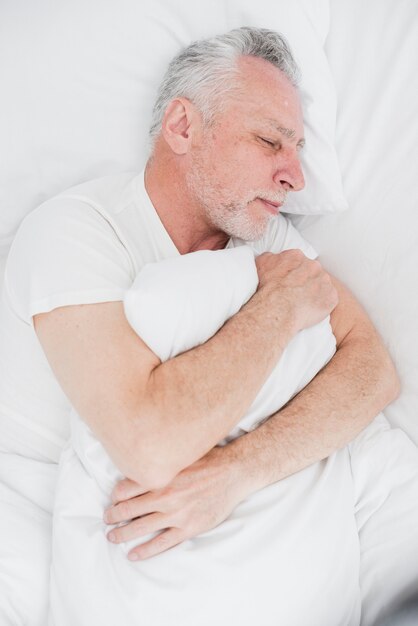As we age, our sleep patterns naturally change. Seniors often find themselves waking up earlier, experiencing lighter sleep, or struggling with insomnia. These issues aren’t just frustrating—they can significantly impact overall health and well-being. Understanding how aging affects sleep and adopting age-specific sleep strategies can make a world of difference.
Thank you for reading this post, don't forget to subscribe!In this guide, we explore helping seniors sleep better through effective, compassionate, and evidence-based techniques tailored to their unique needs. Whether you’re a senior or a caregiver, these insights can help create a foundation for healthy sleep in older adults.
Why Sleep Changes with Age
Many seniors wonder, “Why can’t I sleep like I used to?” The answer lies in how aging affects our sleep-wake cycle.
Common Sleep Challenges in Seniors:
- Reduced melatonin production: This hormone helps regulate sleep and tends to decrease with age.
- Changes in circadian rhythm: Seniors often feel sleepy earlier in the evening and wake earlier in the morning.
- More frequent awakenings: Due to lighter sleep, older adults may wake up more often during the night.
- Medical conditions and medications: Chronic pain, arthritis, and medications can interfere with sleep quality.
- Increased risk of sleep disorders: Conditions like insomnia, sleep apnea, and restless leg syndrome are more common in older adults.
These physiological and lifestyle factors contribute to disrupted rest, making improving sleep for seniors a critical health focus.
The Importance of Quality Sleep for Seniors
Sleep is essential for physical, cognitive, and emotional well-being, regardless of age. For seniors, the benefits of adequate rest include:
- Improved memory and cognitive function
- Better immune system performance
- Lower risk of chronic diseases like heart disease and diabetes
- Enhanced mood and reduced depression or anxiety
- Faster recovery and healing
Conversely, sleep deprivation in older adults can increase the risk of falls, worsen chronic health issues, and impair judgment. That’s why helping seniors sleep better isn’t just about comfort—it’s about maintaining independence and quality of life.
Age-Specific Strategies to Help Seniors Sleep Better
Here are practical and supportive tips to improve sleep for seniors, addressing both biological changes and lifestyle adjustments.
1. Establish a Consistent Sleep Schedule
A regular routine reinforces the body’s internal clock. Seniors should aim to:
- Go to bed and wake up at the same time each day
- Avoid napping too late in the day
- Follow a gentle wind-down routine (e.g., reading, light stretching)
Consistency is key to stabilizing sleep patterns in older adults.
2. Create a Sleep-Friendly Environment
A peaceful, comfortable bedroom promotes restful sleep:
- Keep the room cool, quiet, and dark
- Use blackout curtains and white noise machines if needed
- Invest in a supportive mattress and pillows suited to their body needs
- Remove clutter and tripping hazards
A senior-friendly sleep environment supports safety and relaxation.
3. Limit Screen Time Before Bed
The blue light emitted by phones, tablets, and TVs can suppress melatonin. Encourage seniors to:
- Avoid screens at least an hour before bedtime
- Use blue light filters if screen use is necessary
- Try calming activities like listening to music, meditation, or journaling
Reducing screen exposure helps regulate melatonin and support natural sleep rhythms.
4. Encourage Daily Physical Activity
Light exercise improves sleep quality and promotes deeper rest. Ideal options for seniors include:
- Walking
- Gentle yoga or tai chi
- Swimming or water aerobics
Regular movement enhances sleep efficiency in older adults, but avoids intense activity too close to bedtime.
5. Support a Nutritious, Balanced Diet
Diet plays a major role in sleep:
- Limit caffeine and alcohol, especially in the evening
- Avoid heavy meals within 2–3 hours of bedtime
- Include sleep-supporting foods like nuts, bananas, warm milk, and whole grains
A healthy diet supports both physical health and improved sleep quality in seniors.
6. Address Underlying Health Issues
Many seniors struggle with sleep due to chronic pain or medical conditions. A proactive approach includes:
- Consulting a healthcare provider for sleep difficulties
- Reviewing medications for sleep-disrupting side effects
- Exploring treatment options for sleep apnea, restless leg syndrome, or depression
Managing health holistically is key to better sleep outcomes for seniors.
7. Introduce Relaxation and Mindfulness Techniques
Stress and anxiety often increase with age, affecting sleep. Seniors may benefit from:
- Deep breathing exercises
- Guided meditation or progressive muscle relaxation
- Warm baths or aromatherapy (lavender and chamomile are great options)
These techniques promote calmness, reduce nighttime anxiety, and help prepare the mind and body for restful sleep.
If lifestyle changes don’t improve sleep, it may be time to consult a doctor or sleep specialist. Watch for warning signs like:
- Chronic insomnia lasting more than a few weeks
- Loud snoring, gasping, or choking during sleep
- Daytime fatigue, confusion, or frequent falls
Proper diagnosis and treatment can significantly improve senior sleep health and quality of life.
Also read: What Is Sleep Aging And Why It Is Important
Helping seniors sleep better is a meaningful step toward enhancing their well-being, independence, and happiness. By understanding the unique changes that come with aging and implementing age-specific sleep strategies, seniors can enjoy more restful nights and healthier days.
Whether it’s maintaining a sleep routine, optimizing the sleep environment, or managing underlying health conditions, small changes can make a big difference. Caregivers and loved ones play a vital role in supporting these efforts—because good sleep is not just a luxury; it’s a necessity for thriving in later life.



